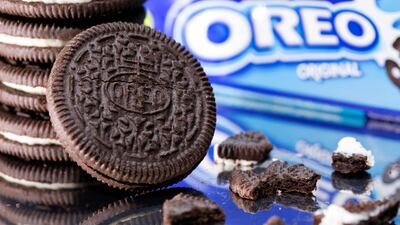The debate about whether or not Oreo cookies in the UAE are halal has been settled by the Ministry of Climate Change and Environment.
The ministry dismissed rumours on Thursday that the popular cookies contain pork and alcohol.
“It has been circulated recently that Oreo biscuits are not halal, because they contain pork and alcohol. We inform you that what has been circulated is incorrect,” the ministry's tweet read.
It said the biscuits “do not contain any animal origin ingredients such as grease and fat”, and that laboratory tests have confirmed this.
“The ministry confirms that all imported and traded foods are subject to an integrated system of procedures and programmes that ensure the highest food safety standards and conformity with the approved specifications in the country,” the ministry added.
The Abu Dhabi Agriculture and Food Safety Authority echoed the ministry's statement, saying there is “no substantiated evidence” that proves that the cookies, manufactured by American company Mondelez International, contain non-halal ingredients.
Mondelez on halal certification
The statements were made after a tweet from 2019 resurfaced, showing the official Oreo account posting that the cookies are not halal. The tweet sparked a conversation about the product, with some even reaching out to Mondelez for confirmation.
In a statement on its website, Mondelez said as Oreos are available worldwide, the company outsources its halal certification “through external agencies”. The statement adds: “Mondelez International is committed to meeting the needs and preferences of our consumers, which can vary from market to market. We consider various factors, including religious food requirements such as kosher or halal, when deciding what to offer consumers in a specific market.”
It added: “The best thing for consumers to do is to check the ingredients and the label to guarantee the suitability for their diet.”
Mondelez has local factories in the different markets it operates in — in the Middle East, the company has production facilities in Saudi Arabia and Bahrain.
The statements from UAE authorities may have confirmed that Oreos are halal, but the cookies in other geographies have been confirmed as not being halal-certified, including in the US and Canada.
In Europe, the cookies are also not halal-certified, “but their composition or production process does not make them unsuitable for Muslim diet”, according to Oreo's UK website.

